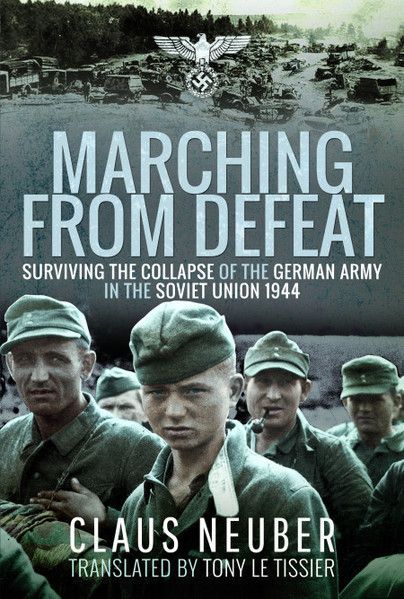| Title: | Marching from Defeat - Surviving the Collapse of the German Army in the Soviet Union 1944 |
| Writer: | Neuber, C. |
| Published: | Pen & Sword |
| Published in: | 2020 |
| Pages: | 191 |
| Language: | English |
| ISBN: | 9781526704269 |
| Description: | In Marching from Defeat Claus Neuber, an artillery lieutenant in the 18th grenadier panzer division of the German Fourth Army, writes about how he made his way through the encirclement of Germans by the Soviets on the Eastern front in the summer of 1944. In June 1944 Operation Bagration started there. (The name is a reference to the Russian general Pjotr Bagration from the time of the invasion of Russia by Napoleon.) The Soviet Union launched a large scale attack on the positions of the Axis powers and broke straight through them. The Eastern front collapsed. Belarus and the east of Poland were liberated soon after that. The Germans made a fast retreat and dug out new positions, that were also quickly overrun. Army divisions were swiftly separated, and thousands of German soldiers were trapped behind Soviet lines due to the rapid advance of the Soviets. Claus Neuber was one of the German soldiers who ended up in enemy territory. He had to make his way through enemy lines to get back to his own position. This road was long. One reason is that he was taken prisoner by Russian soldiers and first had to escape before he could continue his journey, and then he had to evade partisans and Soviet soldiers all the while needing to find food. After nearly 70 days he managed to reach his own troops. In Marching from Defeat he writes about what he went through day by day. The personal anecdotes make it especially interesting, because they make it very human. One example is about a few photographs of German movie stars that were used to decorate the bunker in which he was staying. When the bunker was abandoned, Neuber did not wish the photographs of the women to fall into Russian hands, and therefore he ripped them off the wall, crumbled them into a ball of paper, and buried them. At the start of the retreat there were some attempts to keep the units intact and to withdraw in an organised way. But the situation gradually deteriorated. The units fell apart; the wounded and the dead were left behind. Ammunition, petrol and other supplies ran out. Clothing and shoes fell apart or were lost. In the end only small groups of men remained, all moving west to stay out of the hands of the Soviet soldiers. This journey was made more difficult by partisans, of whom the Germans were even more scared than of the Soviets. These partisans were operating behind German lines and hardly ever took prisoners during this bloody battle. In the end those they took were often killed. Claus Neuber was the only one of this group who eventually managed to reach the German lines. Even his companion of many weeks, Georg Maag, does not seem to have survived the journey. After having reached his own position Neuber was checked by the Germans to see if he was a defector sent back by the Soviets and was given four weeks’ leave. During this period he wrote about his experiences, that became the basis for this book. After it was clear that he had truly fled, he was sent to the Western front to continue fighting. Eventually he was taken prisoner there by the Americans, and he stayed in France during the rest of the war. Claus Neuber was obviously an intellectual in light of his many references to classical literature of famous poets and authors. He analyses his surroundings and is critical of the rumours that he heard. This makes it all the more remarkable that he is not more critical of himself or of the actions of German soldiers during World War II. The Soviets were committing (nearly) all crimes and the partisans were even worse cruel beasts. The civilians that were stuck between both groups feared the Soviet soldiers more and were nearly all kindly disposed to the German soldiers. "Attacks on medical stations are unknown on our side," Neuber states about the German army, in contrast with Soviet soldiers killing the wounded. The period after the war is briefly mentioned by Neuber in just two sentences with a description of a visit to his hometown of Freiburg, present day Świebodzice. The rumours that Claus Neuber refers to are interesting. During the night of 23/24 July 1944, Claus Neuber and his companion Georg Maag were having a conversation with two Polish teachers. They told them that the situation had changed a few days ago. America and Great Britain seemed to have joined the Third Reich in the battle against the Soviet Union. In Lithuania the British were already advancing. At another time there was hopeful talk of German paratroopers in the area, but it turned out that they had not jumped at all. The book contains only text, no photographs. It is a personal account of the experiences of Claus Neuber, and photographs would have offered more depth. Another remark: it is unclear who has added the footnotes in the English translation. Were they added by the translator Tony Le Tissier or were they written by Claus Neuber himself? In any case, Claus Neuber made it through Soviet lines to return to the German troops. Once he returned he wrote down his experiences in 1944, and after the war this writing was made into this current book. This version was then translated into English by Tony Le Tissier to make it available to a wider public. What makes it interesting is Neuber’s single-mindedness during his journey and the fact that he, despite all setbacks, did not give up and was able to reach his own position. |
| Rating: |     Very good Very good |
Information
- Translated by:
- Liesbeth Vrieze-Risseeuw
- Article by:
- Samuel de Korte
- Published on:
- 01-08-2021
- Feedback?
- Send it!




